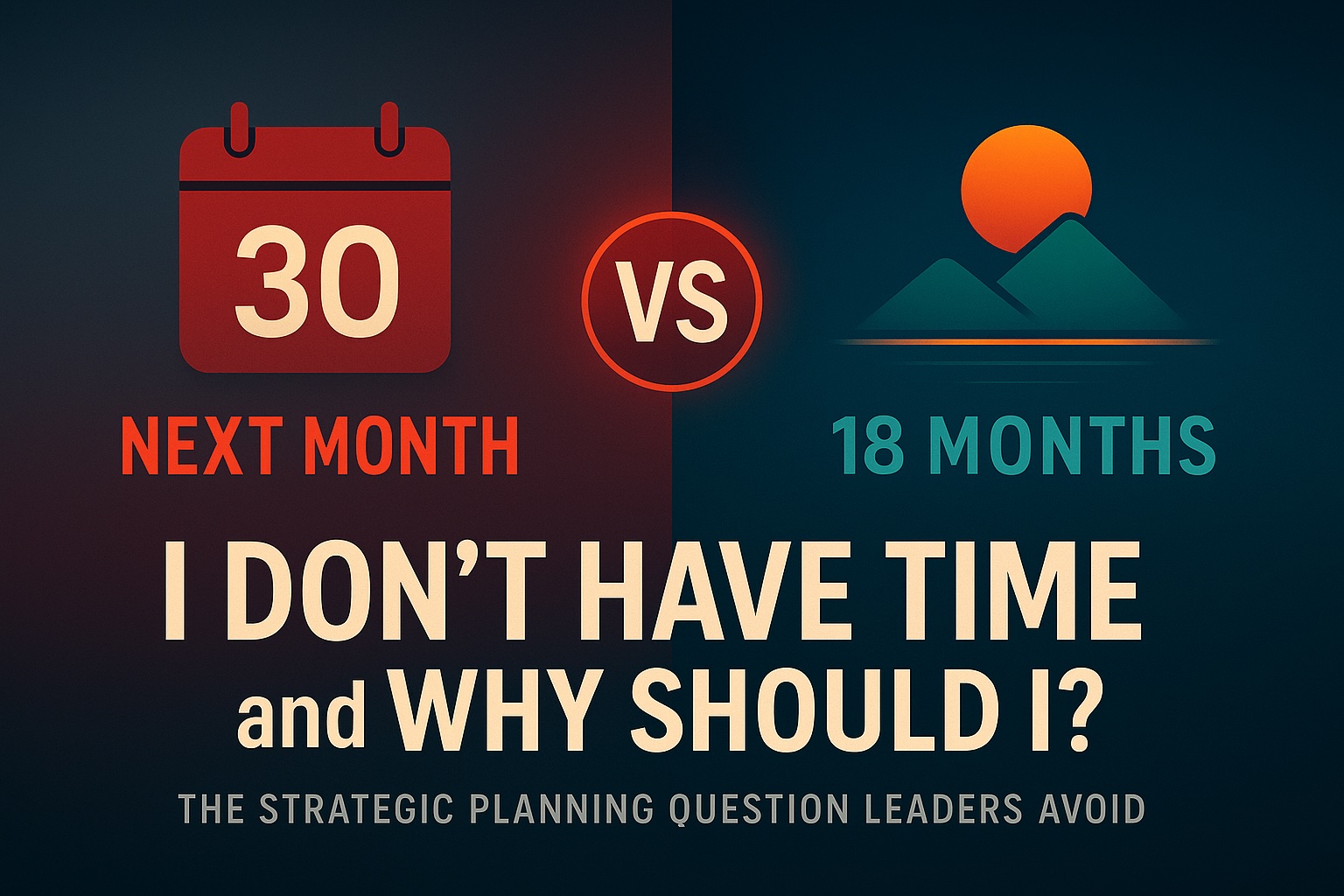"Where do you want to be next month?"
It's a simple question. Most founders, owners, and senior managers can answer it without much thought. Next month is tactical. It's concrete. It's the pipeline you're working, the hires you're making, the product features you're shipping. But here's the real question: Where do you want to be in 18 months? That one? That gets uncomfortable. The clarity evaporates. The confidence wavers. And almost immediately, I hear the same refrain: "I don't have time to think that far ahead." After nearly 40 years working with companies on growth strategy, I've learned something critical: when leaders say they don't have time for strategic planning, what they're really saying is they don't see why they should.
The Tactical Treadmill
Here's what happens when you live month-to-month: you pivot, react,adjust, and execute. Then you look up and ask, "What's next?" And the cycle repeats. You're moving, but you're not necessarily going anywhere. I see this constantly with companies in that 10 to 200 employee range.There's enough happening to keep everyone busy. Fires to fight. Decisions to make. Revenue to protect. The urgency of today drowns out the importance of tomorrow. But when you don't make time to stop, reflect, and look forward, you lose something invaluable: the ability to understand what's going to keep you from achieving your vision.
The Billion-Dollar Lesson
Years ago, I worked with a company that set an audacious goal: reach one billion dollars in revenue within five years. What made it work wasn't just the clarity of the target. It was the commitment to making time for it. We didn't talk about it every day. We didn't obsess over it in every meeting. But every year, we stopped. We had a real conversation:
- Are we tracking toward the objective?
- Are we doing the right things?
- Are we in the right markets?
- Are we competing effectively?
And when the answer was "no," we reflected, adjusted, and made sure we stayed on trajectory. They hit the billion-dollar mark. Not because they had more hours in the day than anyone else. But because they were pragmatic about their vision and disciplined about making time to ensure they stayed aligned to it.
Why "I Don't Have Time" Is Really "Why Should I?"
When someone tells me they don't have time for strategic planning, I dig deeper. And what I usually find isn't a time problem, it's a clarity problem. People don't invest time in things they don't understand or don't see the value in. If you can't connect the dots between strategic planning and the results you want, it gets deprioritized. Every time. So, the question isn't really "Do I have time?" It's "Do I understand why this matters?"
If you're constantly fighting fires but don't know why they keep starting, you're stuck in reaction mode. If you can't articulate where you want to be in 18 months, you're navigating without a compass. And if you're losing market share but haven't stopped to ask why, you're already behind.
The Visioning Framework That Creates Clarity
When I work with a client, we start wherever they are. Let's say it's March 2026. I ask them to paint a picture of where they see their business in December 2027.
Three simple questions:
- Where do you want to be?
- Why do you want to be there?
- What's keeping you from getting there today?
Most of the time, there's not a lot of clarity at first. But that's the point. The exercise forces you to think beyond next month, beyond the next quarter. It forces you to define success in tangible terms and identify the gaps between where you are and where you want to go. Success in these sessions isn't about creating a 50-page strategic plan. It's about making your vision clear and tangible. Once you have that, the tactical decisions become easier because they're filtered through a strategic lens.
Making Time When It Matters Most
Here's the paradox: the best time to invest in strategic planning is when things are working. When you're growing, when cash flow is healthy, when the team is aligned,that's when you have the most control. That's when you can be proactive about building your next phase of growth rather than reacting to what's already breaking. Waiting until you have time usually means waiting until there's a problem.And by then, your options narrow, costs rise, and the competitive landscape has already shifted.
The Choice You're Actually Making
Every day, you're making a choice. You're choosing between tactical execution and strategic direction.Between reacting to today and preparing for tomorrow. Between moving and actually going somewhere. "I don't have time" feels like a reasonable answer in the moment. But strip away the excuse, and the real question emerges: "Why should I make time for this?"
The answer...Because your vision doesn't happen by accident. Because markets don't wait for you to be ready. Because the companies that win aren't just busy, they're intentional. And intention requires time.
Not every day. Not in every meeting. But consistently, deliberately, and with the discipline to stop and ask: Are we still on the path to where we want to go?
If you can't answer that question with confidence, it's not a time problem. It's a priority problem. And that's something you can fix, if you make the time.


